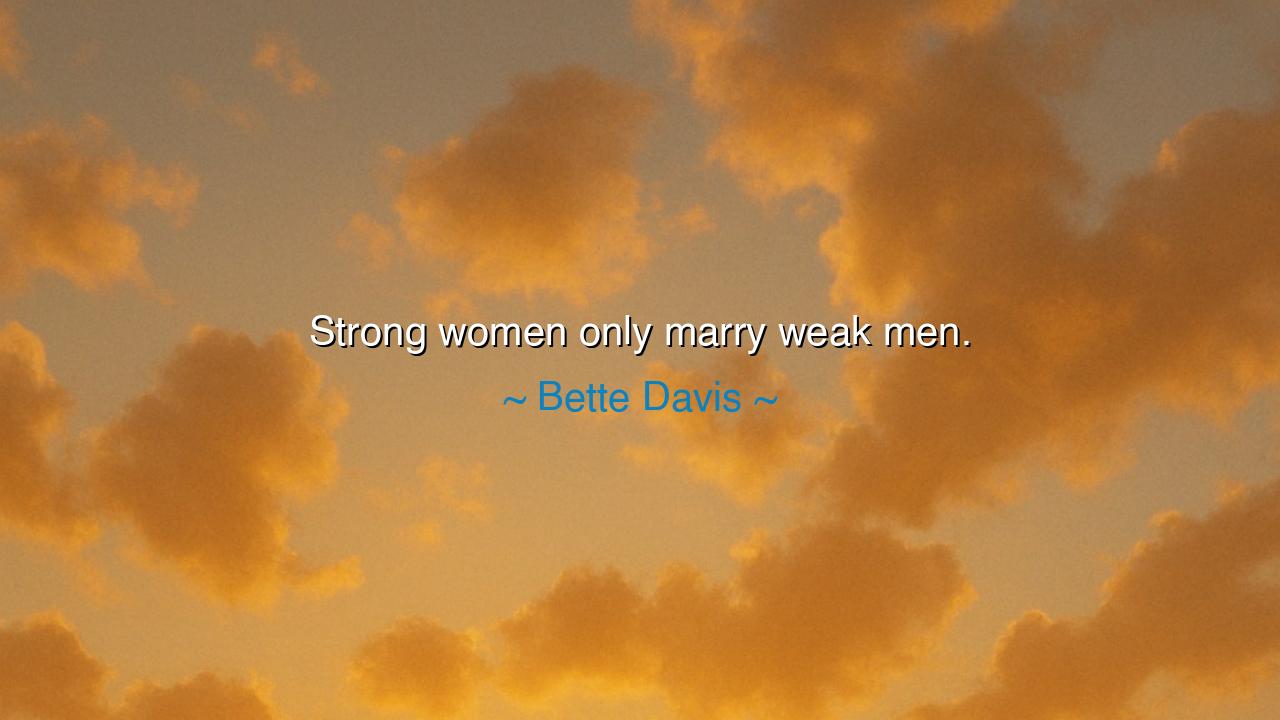
Strong women only marry weak men.






Hear the striking words of Bette Davis, the silver goddess of Hollywood, who lived boldly in an age that demanded silence from women: “Strong women only marry weak men.” This saying, sharp as a blade, is not idle jest, but a reflection of the ancient struggle between power and companionship. In it, Davis speaks to the paradox faced by women of will and fire—when their spirit rises too high, the world often leaves them with partners unable, or unwilling, to match their strength. The quote is both lament and warning, both confession and challenge.
The origin of these words lies in Davis’s own tumultuous life. Known for her fierce independence, her fiery eyes, and her refusal to bend before Hollywood’s system, she carried that same defiance into her private affairs. Her marriages were stormy, many ending in conflict. She learned, as so many before her, that men reared in the shadow of patriarchy often struggled to walk beside a woman who demanded not to be ruled, but to be met as an equal. Thus she declared with bitter candor that strong women are bound, by circumstance or fate, to weak men—for only such men tolerate their power, though they may resent it in secret.
Yet this truth has echoed across history. Consider Cleopatra, queen of Egypt, whose strength and intellect bent empires to her will. Beside her, Antony crumbled under the weight of Rome’s demands, caught between his duty and his passion. Cleopatra’s power magnified his weakness, and in the end, their love was destroyed by the imbalance of strength and will. Likewise, Eleanor of Aquitaine, fierce and unyielding, often clashed with King Henry II, whose pride was wounded by her dominance. These stories show us that the union of strong women and men of lesser spirit often becomes a battlefield rather than a partnership.
But Davis’s words may also hold irony. For what is weakness? Is it cowardice, or is it the quiet inability to rise to another’s height? Many men, confronted with a woman of vision and independence, shrink back rather than rise. They do not see strength as something to join, but as something to fear. And so the strong woman finds herself yoked to those who cannot challenge her, who cannot match her stride, who cannot endure the brilliance of her fire.
Yet let us not take this quote as prophecy alone. There are times in history when strength has found its equal. Think of Franklin and Eleanor Roosevelt. Eleanor, though overshadowed by the office of her husband, grew to wield a strength of her own that reshaped the conscience of a nation. And Franklin, though physically weak, carried the inner resolve to respect her independence and even to lean upon it. Their bond, imperfect yet enduring, shows that even in the clash of power, balance can sometimes be found.
The lesson of Davis’s cry is thus twofold. For women, it is a reminder never to dim their strength for the comfort of others. A true partner must not only endure their fire but cherish it. For men, it is a challenge: weakness lies not in having less power, but in fearing the strength of another. To honor a strong woman is not to compete, but to rise beside her, to meet her with respect, courage, and devotion.
And so, let the practical path be this: if you are strong, seek not to soften yourself for love, but to stand tall until you find one who can stand with you. If you feel weak beside another’s power, do not recoil, but grow, for love is not mastery but mutual rising. Bette Davis spoke in bitterness, but her words shine with warning and wisdom: let no partnership be built upon fear, but upon the meeting of equals. For only when strength honors strength can love endure without crumbling into ashes.






AAdministratorAdministrator
Welcome, honored guests. Please leave a comment, we will respond soon